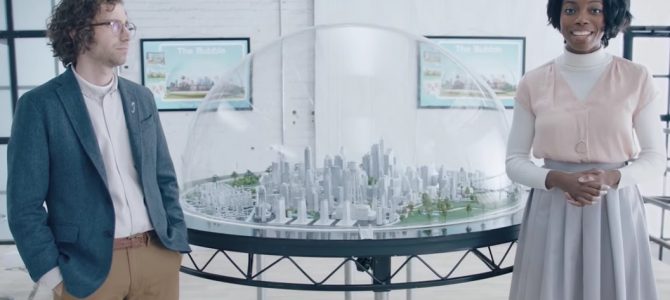Democrats looking to figure out what went wrong and how to recover would actually be well-advised, for once, to take a cue from “Saturday Night Live.” No, I’m not recommending Alec Baldwin’s slightly lame impersonation of Donald Trump. I’m recommending their post-election sketch about left-leaning urbanites wanting to escape to a “bubble”—not just the metaphorical bubble of an urban hipster microculture, but a literal bubble in the form of a fully enclosed community shielded from the outside world.
This sketch is so dead-on in describing, point for point, the pretensions and hypocrisies that drive everyone else nuts about urban cultural elites. It’s so accurate that I have to wonder: if the folks at SNL knew about the bubble, how come they didn’t tell their viewers before the election?
First, let’s get a grasp on the message of that sketch, which was unusually lean and disciplined in its execution of a clearly defined premise. It ticks off just about everything we would have wanted to tell disappointed Hillary Clinton supporters about the peculiar cultural assumptions they take for granted without much thought or skepticism.
They pride themselves on being open-minded, but they actually close themselves off to contrary arguments; The Bubble is a “community of like-minded free-thinkers—and no one else.” They think they’re more thoughtful and intellectual, but they’re really just confirming each other’s biases; a “wide array of diverse viewpoints” is two people doing nothing but agreeing with each other. They think they’re well-informed and cultured, but they draw from a very narrow range of trendy lifestyle fads and “only the good websites.” They think of their lifestyle as simple and accessible, but only the well off can afford it. (“Anybody is welcome to join us,” the ad proclaims, but a one-bedroom apartment starts at $1.9 million—not far off from reality in Manhattan or San Francisco.)
They say they are above racial division, but they’re the ones obsessing over it. (“We don’t see color here—but we celebrate it.”) Then there’s the preening, condescending race-consciousness of the privileged white “progressive”—who, in this sketch, ostentatiously points to the “black power” button on his lapel and gets a subtly exasperated roll of the eyes from his black co-star.
Most important: They depend on the support and protection of blue-collar workers who don’t share their values and culture. In the sketch, those people are absent because they can’t be convinced to live in The Bubble. In the real world, they are all over the place, but they are ignored.
So sure, this is a really good place for Democrats in the cities to start: to realize that they are living in a very special cultural enclave, and if they want to win elections again, they need to be able to talk to—and listen to—people outside of that enclave. “Saturday Night Live” might have saved some heartache if they had shown more of this self-awareness before now.
Then again, this is the same show that gave us one of the most inside-the-bubble moments in recent television history, a post-election opening that was part funeral, part beatification for that new martyr, Saint Hillary of Clinton. (For those unfamiliar with the conventions of SNL, we’re supposed to recognize Kate McKinnon’s hair and white pantsuit as the look she wears when portraying Clinton.)
The truth is that the writers for “Saturday Night Live,” and probably a lot of their audience, already know they are in a bubble. They didn’t all grow up as “coastal elites.” They moved there and worked hard to put themselves into their bubble—and, unfortunately, to define themselves in opposition to the (usually) suburban middle-class values they left behind.
There’s nothing wrong with arranging your life the way you want it or moving to a neighborhood where others like to live the same way. To put the shoe on the other foot, the Brooklyn hipster is no more or less in a bubble than the guy who never moved away from home and lives within the “bubble” of his church and his rural town—and who probably also defines himself in opposition to other Americans, as the opposite of those pampered “elites” in the big cities. I like a point made by Derek Thompson: it’s all “bubbles,” and it’s all “real America.”
But the thing about bubbles is that after a while, it’s difficult to remember that you’re in one. It’s easy to fall back reflexively on the same unexamined tropes without ever having to hear much skepticism from the people around you.
Some of us have been warning the left for years that this makes them weak, that it makes them almost totally unaware of how unconvincing some of their favorite causes have become to the majority of America. On a more practical level, they also fail to realize how unappealing some of their candidates are to voters in other parts of the country, the parts that control a majority of the Electoral College.
They needed a reminder, and this election is a big one. That SNL sketch is a sign that some of them are beginning to look in the right direction.
I don’t agree with Democrats on much, but I do think the republic needs an effective opposition party. So I really hope they don’t have to go through the dreadful experiment of running Bernie Sanders in 2020—the guy whose picture appears on the currency inside The Bubble—before they finally figure out how to break through their own filters.
Follow Robert on Twitter.









